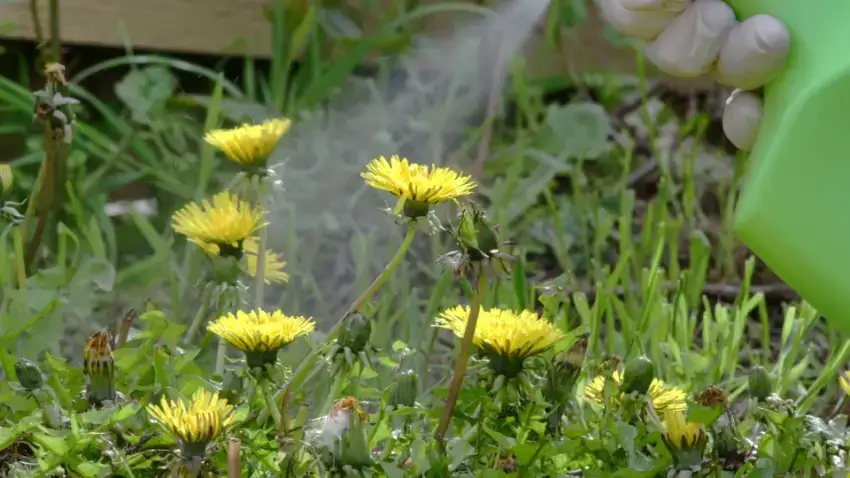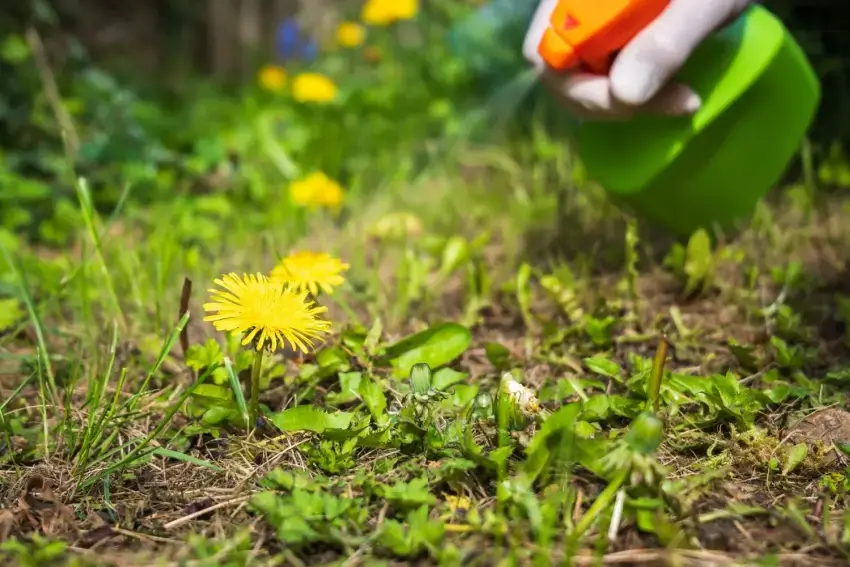Vinegar and Weed Control: Does Vinegar Kill Weeds?

Nothing ruins the look and curb appeal of a beautiful lawn more than a few patches of weeds. Weeds like dandelions, crabgrass, and Canada thistle can sneak into even the best-managed lawns. These patches of weeds not only look bad, but they can compete with your grass and other plants for water, sunlight, and nutrients that are essential to a healthy landscape. If you’re looking for an eco-friendly way to destroy weeds, the solution might be the same thing you put on your salads – vinegar! But does vinegar kill weeds effectively?
If you’re wondering if vinegar weed killers are really a thing, the lawn care experts at The Grounds Guys® have the answer.
The short answer is, yes! Vinegar can be an effective weed killer when used in the right circumstances and with the right precautions. In this article we’ll review how vinegar kills weeds, how to use it, what type of vinegar to use, and why it might be the best option for your lawn and/or garden.
Table of Contents:
How Does Vinegar Kill Weeds?
Head to your nearest home improvement or gardening store, and you’ll see the shelves stacked with chemical-based weed killers. However, you should know these are not the only option. If you prefer a more natural solution to dispatching ugly, stubborn weeds, vinegar might be just what you’re looking for.
Will vinegar kill weeds? Yes, it will. Vinegar contains acetic acid, a desiccant that draws out moisture from the foliage and causes the weeds to dry out and die. However, if you want to maximize vinegar’s weed killing power, include some salt and a little dish soap.
Dish soap will add surfactants to your homemade weed-killing solution, which dissolves the protective coating on the leaves of weeds and improves the effectiveness of the vinegar. Salt works to dry out the weed’s root system. You’ll just need to be very careful with your application. Putting too much salt in the soil will change its pH, which can make growing grass, plants, and flowers in that soil more difficult, which may defeat the purpose of getting rid of weeds in the first place.
Here is one homemade vinegar weed killer recipe you can try:
- 3.75 litres of vinegar
- 250 ml (1 cup) of salt
- 15 ml (1 tablespoon) of plain dish soap
Once you have combined all of the ingredients, put the solution into a plastic spray bottle for easier, and more targeted application. This will help you target specific areas and help you avoid accidentally spraying areas you don’t want sprayed.
How to Make Your Vinegar Weed Killer More Effective
Choosing the right time to apply your homemade weed killer will maximize its effectiveness. If you hit your weeds with your vinegar solution on a dry, warm day, you will enhance its effectiveness. In many cases, the leaves of the weeds will shrivel up and be gone by the next day. However, the effectiveness of vinegar as a weed killer will increase with a higher acetic acid concentration.
The bottle of vinegar you have in your pantry or under the sink likely contains a 5% concentration of acetic acid. Household vinegar works best on small, young weeds and may not be strong enough to defeat mature or perennial weeds. For that, you’ll need a different type of vinegar.

Types of Vinegar Used to Kill Weeds
When it comes to vinegar and weed control, many homeowners wonder, “does white vinegar kill weeds?” When considering the use of vinegar weed killer, there are several options to consider. Understanding the different types of vinegar and the impact they have on your grass, plants, and weeds will help you make the right choice for your lawn and property. Here are some different types of vinegar to consider:
Household (White) Vinegar
Readily available in grocery stores, white vinegar contains 5% acetic acid and can work well on young and small weeds. As a bonus, you can also use this vinegar for cooking and cleaning. It’s a triple threat and multi-purpose solution for many household tasks.
Horticultural Vinegar
You can find horticultural vinegar at certain gardening or home improvement stores. As the name implies, this vinegar is designed specifically for weed control and typically contains 10 to 20% acetic acid. Horticultural vinegar can be a good option for killing tough, mature weeds, but it can also cause damage to plants, flowers, shrubs, and your lawn if not used carefully.
This level of acetic acid can cause chemical burns, so you’ll need to handle this vinegar with caution and wear gloves and protective eyewear when applying it.
Industrial Vinegar
If you find yourself in possession of industrial vinegar, you’ve taken your war against the weeds a little too far. With an acetic acid concentration of 20 to 30%, industrial vinegar is nearly always used for commercial applications. It’s not advisable to use industrial vinegar for residential weed control, especially if you lack experience and training on how to use, apply, and store it. Use of this type of vinegar is best left to the pros.
Does Vinegar Kill Grass and Plants?
Before you declare war on your weeds and start loading up a spray bottle with vinegar, it’s crucial to know that your grass and plants could become collateral damage. Vinegar is a non-selective herbicide, meaning it can harm or even kill any plants it comes into contact with. That includes your grass, flowers, shrubs, and other plants that make up your landscape.
Will vinegar kill plants? Yes, we can’t stress this enough. When applying vinegar to weeds, take precautions to protect all the areas you want to keep safe from the effects of vinegar. Even small amounts of vinegar can cause brown spots and curling on the leaves of your plants and flowers.
If your vinegar solution contains salt, it could also damage your soil, harming the root systems of nearby plants and making it more difficult to grow new plants. It can also cause brown patches on your lawn. So use your new found weed killer wisely and with care to avoid damaging other plants, flowers, and your lawn.
How to Use Vinegar for Weed Control
Does vinegar kill grass? As mentioned above, yes, vinegar will damage and kill your grass if used incorrectly. This means you need to be extremely careful when applying vinegar for weed control on your property. Here are some tips and advice to follow to minimize the risks and damage that can be caused by using vinegar:
- If you want to get rid of small or young weeds on your property, mix 3.75 litres of white vinegar with 250 ml of salt, and 15 ml of dish soap. If you have larger and more mature weeds, consider using horticultural vinegar.
- Pour the solution into a spray bottle or pump sprayer for better accuracy.
- Only apply vinegar weed killer on a warm, sunny day with little to no wind. You don’t want your vinegar drifting onto nearby plants and causing damage.
- If you’re using horticultural vinegar, wear gloves, goggles, and full-coverage clothing.
- Protect nearby plants using plastic sheeting or a spray shield.
- Spray the vinegar mix directly onto the leaves and stems of the weeds until they are thoroughly covered.
- Monitor the weeds and reapply the vinegar solution as needed.
- Reseed or replant grass and other plants if the vinegar treatment leaves bare spots in your lawn or garden.
The Truth About Vinegar and Weed Control
Vinegar can be an effective and non-toxic weed killer that can combat small clusters of weeds in your lawn, but it does have some drawbacks. Most notably, it can harm your grass, plants, and soil if you don’t apply it correctly and carefully. Also, vinegar often doesn’t kill the roots of weeds, so they often come back to haunt you season after season.
If you’re dealing with a large outbreak of weeds on your lawn or property and vinegar isn’t doing the job, the landscaping and lawn care professionals at The Grounds Guys® can help. Our local teams throughout Canada are highly experienced in performing effective residential weed and pest control. We use eco-friendly solutions whenever possible.
We also offer lawn care and landscape maintenance services to ensure your property looks its absolute best throughout the year. Oftentimes, the best way to combat weeds is to prevent them by keeping your lawn strong and healthy.
Get your free estimate today.
This article is intended for general guidance only and is not applicable to every situation. You are responsible for determining the proper course of action for your property and situation. The Grounds Guys are not responsible for any damages that occur as a result of advice and/or guidance derived from its blog content.
The Grounds Guys services may vary by location. Contact The Grounds Guys franchise nearest you for more information.
 Click to call
Click to call


